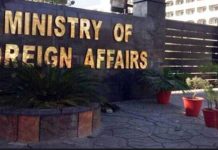ISLAMABAD, – The menace of terrorism, which is often politically motivated, has bedeviled Pakistan for decades, despite successful kinetic operations against militant outfits.The aftermath of years of war on terror, man-made and natural disasters, ethnic and sectarian conflicts, poverty, inequality and injustice have etched the psycho-social fabric of the country adversely.
The virtually unaddressed psychological damage has instilled a sense of perpetual fear leading to insecurity, paranoia, and intolerance into the minds of the citizens. Despite being a resilient nation, Pakistanis live through un-remitting emotional andsocial trauma on a daily basis.
Unregulated, irresponsible and insensitive media reporting is an impact multiplier of terrorism in Pakistan.Given groundbreaking new frontiers in neuroscience on the various ways brain stimulation can enhance thoughts and behaviours, a much needed review of its applications not only in the security services and military but also on ordinary citizens is the need of the hour. This was discussed at the Roundtable on Psycho-Social Toxicity in Pakistan: A Fallout of Terrorismorganized by IPRI here in the capital today. The roundtable moderated by
Dr Muhammad Tahir Khalily, Vice President (Academics), Department of Psychology, International Islamic University included DrShakilJehangir Malik, Professor of Psychiatry, University of Sussex, UK as the Keynote Speaker. The roundtable attended by eminent psychiatrists, ex-military servicemen, law enforcement representatives and media, including DrUzmaMasroor from Air University; Lt. Gen. (R) Shahid Iqbal; DrZarqaSuharwardyTaimur; Brig. Babur (R) Barlas; M. Ali Babakhel, Director NACTA; Dr Salma Siddiqui from NUST; DrAdeelaRehman from Fatima Jinnah Women University; and Air Cmdr. (R) Tanweer N Siddiqui.
It was shared that under the guise of fifth generation warfare, states are investing in technologies and research on how a country can be devastated through low intensity warfareusing terrorism.While the experience of violence does not necessarily lead to psychiatric morbidity, an overload of information, unchecked globalization, weakening of the family system, human values and societal inequality can test the limits of human endurance. Speakers pointed out that insecurity breeds xenophobia which then leads to stereotyping as well as ostracizing of vulnerable and marginalised groups. Unfortunately, the state’s role in curtailing such societal schisms has been very weak, especially in terms of mental healthcare facilities. Speakers warned that lack of state empathy and responsiveness towards one’s citizenry cantrigger antipathy, anger and frustration even amongst the most educated and culturally varying groups within society.Such discontent, demoralization and dehumanisation shatters peoples’ sense of belonging and identity, forcing them to drift away from the societal sphere, they stressed.
Speakers lamented that intolerance is now pervasively found amongst every rung of Pakistani society manifested through behaviour of readily resorting to violence to settle minor disputes such as recently seen in Lahore. They stressed that the psycho-social impact of terrorism is not only multipronged but also intertwined. PTSD, depression, and use of drugs has become endemic amongst Pakistanis who are exposed to gruesomemedia contenton a regular basis.
It was recommended that robust and inclusive mental health services should be provided; and a multidisciplinary approach espoused at the policy level to better understand trauma generated by terrorism with emotional coaching and healthy mentoring, especially of children. The need to revitalize intergenerational communication and responsible use of communication technologies was also emphasized rather than depending on the ocean of information on the Internet which can lead young people astray. It was also stressed that social capital needs to be improved through capacity development and developing gender-specific, holistic public health strategies since women and men are impacted differently by trauma. There was also a consensus that a complete paradigm shift is required on the policy level wherein legislationshould be carried out with input from all relevant stakeholders.The role of the media was extensively discussed vis-a-vis coverage of violent incidents and insensitive reporting of traumatic events which has a multiplier impact contributing to psycho-social disequilibrium. It was urged that the media should be trained to follow an ethical code of conduct in their reporting and content.
















